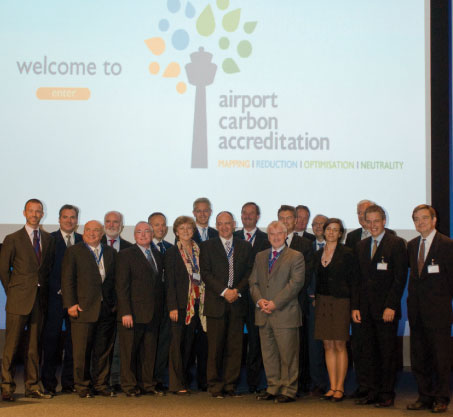
Dr Yiannis Paraschis, outgoing President of ACI EUROPE and Director General Olivier Jankovec, with the representatives of each of the airports participating in Airport Carbon Accreditation. At launch, the scheme received commitments from 33 airports in 11 countries, accounting for 26% of European airport traffic.
 Airport Carbon Accreditation was launched with the symbolic pressing of a button at the ACI EUROPE Annual Assembly. Joining outgoing ACI EUROPE President Dr Yiannis Paraschis and Director General Olivier Jankovec for the launch were Daniel Calleja, Director Air Transport, European Commission, David McMillan, Director General of EUROCONTROL, and Gerry Lumsden, Secretary General of ECAC, each of whom is a member of the independent Advisory Board for the scheme.
Airport Carbon Accreditation was launched with the symbolic pressing of a button at the ACI EUROPE Annual Assembly. Joining outgoing ACI EUROPE President Dr Yiannis Paraschis and Director General Olivier Jankovec for the launch were Daniel Calleja, Director Air Transport, European Commission, David McMillan, Director General of EUROCONTROL, and Gerry Lumsden, Secretary General of ECAC, each of whom is a member of the independent Advisory Board for the scheme.
The response of Europe’s airports towards Airport Carbon Accreditation has been especially encouraging, particularly as reducing CO2 emissions through energy efficiency measures can yield the win-win, of improving public profile, while also achieving profitability and competitiveness goals. Airports have long been addressing the environmental impact of their activities, but Airport Carbon Accreditation specifically recognises their efforts to manage and reduce CO2 emissions within their direct control.
There are four levels of accreditation – Mapping, Reduction, Optimisation and Neutrality – with the process encouraging airports to reduce their carbon emissions with the ultimate goal of achieving carbon neutral operations.
Environmental credibility
The scheme is being administered by WSP Environmental – a global consultancy providing advice on all aspects of environmental, energy, sustainability, climate change and business risk issues. “It’s not often that you get to work with a world class industry body, doing something that is really groundbreaking. Airport Carbon Accreditation has been launched at just the right time and provides a really credible commitment on behalf of European airports towards carbon and climate responsibility. We really enjoyed developing the scheme with ACI EUROPE and now as administrators, we are enjoying a different level of engagement – working with individual airport groups to understand and work their way through the process. We are proud to be part of this initiative and see this as a beginning for helping airports meet these new challenges. We believe the saying that ‘if you can’t measure it, you can’t manage it’ and we like to think that Airport Carbon Accreditation is the first step towards real business benefits to participants from a commitment to carbon efficiency,” said Peter Sharratt, Director of Sustainability & Climate Change, WSP Environmental.
Dubrovnik Airport – carbon neutral by 2012
Dubrovnik Airport wants to respond to the demands of the new century and define its framework of development through its environmental protection strategy, explained Tomislav Macan, Chief Technical Officer. One of its environmental projects is to become carbon neutral through participation in ACI EUROPE’s Airport Carbon Accreditation.
Since 2000, Dubrovnik Airport has developed its services and every year invests more funds in developing environmental projects. A waste water treatment plant has already been developed and a 100kW solar energy power plant is planned.
“The terminal building that is under construction satisfies the strongest energy saving recommendations through extremely good noise and thermo insulation. Last, but not least, is the project to reduce carbon emissions through the three phases of Airport Carbon Accreditation to become carbon neutral in 2012,” said Macan.
The solar powerplant will reduce Dubrovnik Airport’s energy needs; sophisticated insulation materials and elements of the new terminal will reduce the need for additional energy; and the purchase of environmentally-friendly Ground Service Equipment (GSE) will replace the existing non-environmentally friendly GSE within the next 10 years.
“Through participation in Airport Carbon Accreditation, it is our goal to show that Dubrovnik Airport is one of the leaders in the region, in terms of new technology and protecting the environment. It is a great honour and a challenge for Dubrovnik Airport to be an early participant,” said Macan.
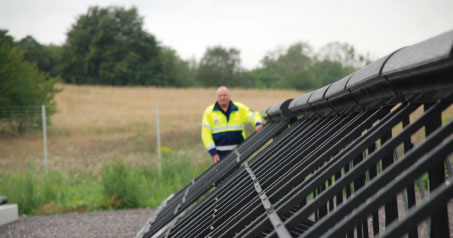
LFV’s goal is to achieve zero carbon dioxide emissions from fossil fuel by 2020. Initiatives such as the solar heat installation at Malmo will contribute towards meeting this target.
LFV Airports – Systematic environmental practise
Stockholm-Arlanda Airport, Stockholm-Bromma Airport and Umeå City Airport are the three largest Swedish airports of the LFV group, which has signed-up to Airport Carbon Accreditation. “Through LFV’s long-term and consistent environmental activities it is only natural that we participate in Airport Carbon Accreditation. This participation gives us the ideal opportunity to proceed with our existing successful environmental actions through organised, international comparisons,” said LFV’s Director General Lars Rekke.
Umeå City Airport has for a long time been active in incorporating systematic environmental activities. Therefore, it was not a hard decision for Airport Manager Karin Larsson-Tängdén to take on the challenge of applying to become Airport Carbon Accredited: “By comparing ourselves with other European airports we can learn so much more about systematic environmental work and through our participation we can, of course, influence other airports,” she said.
The LFV Group has 10 environmental targets, which are connected to a number of activities aimed at creating greener airports. During the last few years, results from LFV’s environmental activities have been noticeable. Emissions of carbon dioxide were reduced by a third between 2005 and 2008. LFV’s goal is to achieve zero carbon dioxide emissions from fossil fuel by 2020.
Airport Carbon Accreditation is also overseen by an independent Advisory Board. Independent oversight is essential to ensuring that it is perceived externally as being credible. The participation of important organisations in this oversight – such as the European Commission, EUROCONTROL, ECAC and the United Nations Environment Panel (UNEP) – ensures that its standards are applied rigorously.
Daniel Calleja, Director Air Transport, European Commission, said “The Commission congratulates ACI EUROPE on taking this important initiative. We recognise that this is a serious initiative which aims at establishing a robust scheme that is credible in environmental terms. The scheme not only offers the possibility for European airports to demonstrate the contribution they are making to addressing the challenge of climate change, but to have this verified by an independent organisation. We fully support initiatives of this kind and believe they have an important role to play in helping move the European aviation system on to a more sustainable footing.”

The four levels of Airport Carbon Accreditation: Mapping, Reduction, Optimisation and Neutrality
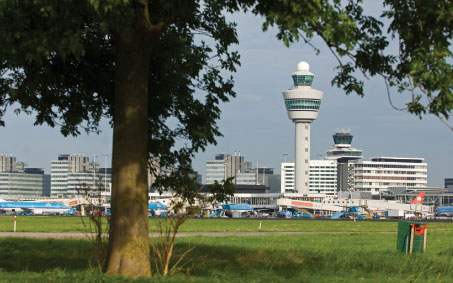
Amsterdam Airport Schiphol is among those airports to have signed up to Airport Carbon Accreditation, as a key part of its strategy to achieve carbon neutrality by 2012.
The President of the European Civil Aviation Conference, Portuguese Director General of Civil Aviation Luis Fonseca de Almeida, said that ECAC is pleased to lend its endorsement to ACI EUROPE’s Airport Carbon Accreditation, as a good example of the industry in Europe acting proactively to address the impact of its activities on climate change. He added that “Europe’s Directors General of Civil Aviation consider this an initiative to be commended and encouraged, at a time when the civil aviation sector is being looked to for its contribution to addressing the very serious issues around global warming and climate change.” The common framework adopted by ACI EUROPE should facilitate benchmarking between participants and, more importantly, the sharing of best practice. This will help to accelerate performance improvement, while also offering a consistent measure by which to judge an airport’s management of natural resources.
MAG – Carbon neutral targets
With Manchester Airports Group (MAG) being the only UK airport group to be striving to achieve carbon neutrality for all four of its airports, it was an obvious choice to participate in the pilot programme of ACI EUROPE’s Airport Carbon Accreditation. The airports of East Midlands, Humberside and Bournemouth have a target to be carbon neutral by 2012 with Manchester to follow shortly after in 2015.
“We have based our ongoing strategy around sustainability and have backed this up through a partnership of research, based in Manchester at Manchester Metropolitan University, through the Centre for Air Transport and the Environment and the nationally focused Omega programme to get to this stage,” said Geoff Muirhead, Chief Executive of MAG. “We were delighted to host the ACI EUROPE Annual Assembly in Manchester in June, bringing senior executives and government ministers to debate the issues affecting aviation. Aviation has been key in the development of the city of Manchester and the North West of England’s economy and we want to continue to maximise the benefits aviation brings while mitigating its impacts. Airport Carbon Accreditation will allow airports like ours to continue to develop in a balanced and sustainable manner.”
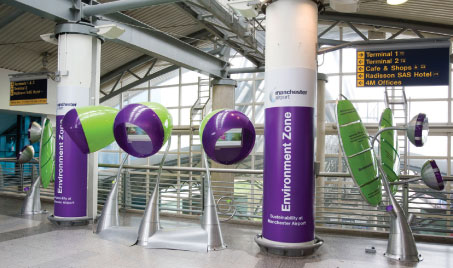
Manchester Airport’s Environment Zone highlights the numerous sustainability efforts it is undertaking. Manchester Airports Group has a target that all four of its airports will be carbon neutral by 2015.
The scheme also takes into initiatives undertaken with stakeholders on the airport site, stemming from the Memorandum of Understanding signed by ACI EUROPE and EUROCONTROL last year. ACI EUROPE is already working with EUROCONTROL to assist more airports in adopting these efficiencies. EUROCONTROL will help airport stakeholders reduce their Scope 3 carbon footprint by enabling efficiency measures under the European Flight Efficiency Plan. These include flow management, Collaborative Decision Making and Continuous Descent Operations. Together, these initiatives will reduce CO2 by almost three million tonnes each year and flight fuel costs by around €500 million explained David McMillan, EUROCONTROL Director General. “EUROCONTROL is aiming for the widespread adoption of Collaborative Environmental Management at airports, which will help to address Scope 3 emissions under Airport Carbon Accreditation. Scope 3 cannot be effectively addressed without such collaboration. Additionally, EUROCONTROL’s data services could help to support measurement of aircraft operational efficiency by using independent and consistent information – so contributing to improved efficiency and better performance,” he said.
Avinor – exchanging experiences
Nic Nilsen, managing director, Oslo Airport: “Avinor already discloses its greenhouse gas emissions in accordance with the Green House Gas (GHG) Protocol. But with participation in ACI EUROPE’s Airport Carbon Accreditation a new arena for learning and exchanging experiences with other airports is at our fingertips. We aim to be one the top airports in Europe with respect to the protection of the environment, therefore we keenly support this ACI EUROPE initiative.”
Step changes in efficiency

David McMillan, EUROCONTROL Director General: “EUROCONTROL is aiming for the widespread adoption of Collaborative Environmental Management at airports, which will help to address Scope 3 emissions under Airport Carbon Accreditation.”
Commitment from all levels of airport management is required as everyone can make a difference, from the major influence of leadership to the small steps taken by individuals, such as switching unnecessary lights off. “When environmental thinking is applied by an entire workforce, the resulting change of mindset can drive step changes in energy efficiency, renewable energy and emissions reduction. So, yes, we all need to be committed to reducing our carbon footprint,” said McMillan. “Additionally, the effective management of Scope 3 Emissions will require commitment from an airport’s partner organisations, including ATM stakeholders.”
Flight efficiency is a Scope 3 priority and is also a key ATM Performance Area for SESAR, as are SES II and the European Flight Efficiency Plan. Flight efficiency is at the heart of achieving Scope 3 Accreditation and hence SES II and Airport Carbon Accreditation are entirely in accord. “The real benefits, however, will only come from demonstrable reduction in fuel use and emissions, which is where Airport Carbon Accreditation can add considerable value by providing a consistent framework to track and demonstrate real efficiency improvements,” said McMillan.
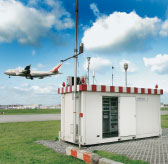
A special monitoring station at Frankfurt Airport which is the first participant to become Airport Carbon Accredited, achieving the ‘Reduction’ level.
Destination: Airport Carbon Accredited
The following airports signed up to participate in the scheme, at the launch:
- Aéroports de Paris: Paris-CDG, Paris-Orly
- Amsterdam Airport Schiphol
- Athens International Airport
- Avinor: Oslo Airport, Trondheim Airport, Ålesund Airport, Kristiansand Airport
- Dublin Airport Authority: Dublin Airport, Cork Airport, Shannon Airport
- Dubrovnik Airport
- Frankfurt Airport
- LFV Airport: Göteborg Airport, Landvetter Airport, Kiruna Airport, Luleå Airport, Malmö Airport, Ronneby Airport, Stockholm-Arlanda Airport, Stockholm-Bromma Airport, Umeå Airport, Visby Airport, Åre Östersund Airport
- Manchester Airports Group: Manchester Airport, East Midlands Airport, Bournemouth Airport, Humberside Airport
- SEA Milan Airports: Milan-Malpensa Airport, Milan-Linate Airport
- TAV: Istanbul Atatürk International Airport, Ankara Esenboga International Airport, Izmir Adnan Menderes International Airport
Last year, Fraport announced a strategic goal to reduce CO2 emissions per passenger and per 100 kilograms of freight by 30% by 2020. “If we want to grow our business and our airport, then we have to do this in a sustainable manner. For example, our capacity expansion at Frankfurt Airport will not add to CO2 emissions – it will be carbon neutral,” said Fraport spokesman Robert Payne. “Another benefit of the scheme is that carbon management aspect of Frankfurt Airport’s modernisation and renovation projects will not only provide ecological benefits but also ultimately economic savings. That makes good business sense and helps our customers too. Our participation in Airport Carbon Accreditation is also important because it helps Frankfurt Airport maintain international leadership.”
On 14 September 2009, Frankfurt Airport was awarded the ‘Reduction’ level of accreditation, in recognition of its significant reduction of carbon emissions through initiatives undertaken in the last three years, which have resulted in a saving of around 42,000 tonnes of CO2. Olivier Jankovec, Director General ACI EUROPE, hailed this first accreditation as yet another milestone for Airport Carbon Accreditation, commenting “Frankfurt Airport is an excellent example of the action that European airports are taking to lower their carbon footprint.”
Athens International Airport (AIA) – concrete climate action
Panagiotis Karamanos, Manager, Environmental Services, Athens International Airport was the Chairman of the special ACI EUROPE taskforce formed to develop Airport Carbon Accreditation. “Athens International Airport was a key contributor in the creation and design of the programme and as one of the initial participants, we want to send a strong signal about our commitment to reducing carbon emissions into concrete action. Furthermore, AIA’s participation in Airport Carbon Accreditation also represents the next logical step in addressing its climate impact by mapping, verifying and continuing its efforts to reduce its carbon footprint.”
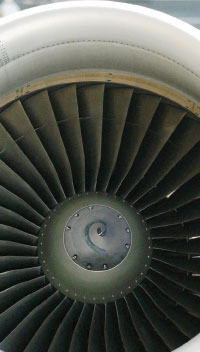
EUROCONTROL will help airport stakeholders reduce their Scope 3 carbon footprint by enabling efficiency measures under the European Flight Efficiency Plan. These include flow management, Collaborative Decision Making and Continuous Descent Operations.
The design of Airport Carbon Accreditation was led by ACI EUROPE’s members and critical steps were systematically approved by the board of ACI EUROPE. The scheme reflects the ongoing evolution of airports as efficient, responsible businesses. Accreditation to a formal and recognised benchmark for carbon emission management will add additional credibility to their environmental track record. Airports have been at the forefront of energy management for decades now, often developing energy efficiency practices that are then widely copied by general industry. With increasing public concern over climate change, coupled with rising energy prices, there is now even more emphasis on eliminating energy wastage and finding less damaging alternatives. All sectors of business must now behave responsibly towards the Earth’s energy and climate resources. Airport Carbon Accreditation is a clear signal of this responsibility. For the airport operators applying to the scheme, Airport Carbon Accreditation is the first real opportunity to demonstrate at European level the extent of their environmental activities and to get recognition for it. For ACI EUROPE, it is about concretely engaging the airport sector to play its part in addressing the impact of aviation on climate change, alongside with airlines and other industry stakeholders. For the travelling public and communities across Europe, it is their first opportunity to see how the airport community is responding to the issue of climate change.
More information on the scheme is available at www.airportcarbonaccreditation.org







